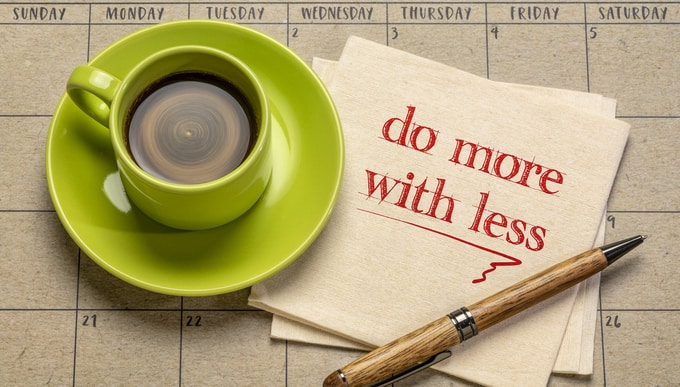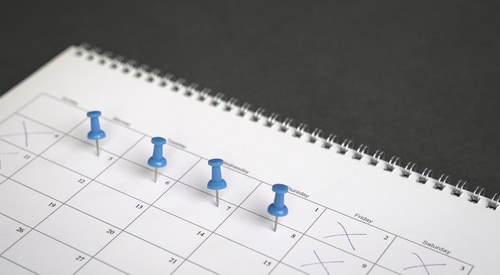The burnout gap between men and women in corporate America nearly doubled in the years 2020-21, according to the latest Women in the Workplace 2021 report. Women, it suggested, are stepping up to be the employees their organisations need them to be, but they’re facing higher stress levels as a result.
‘We’re all aware of the social context we’re operating in’ said one of the women surveyed. ‘For me, I think, am I going to be another one that falls from all this? I’m fighting so hard, but it feels like the odds are against me, and it hurts.’
It’s this fight that’s still the hallmark of so many women’s working lives: the fight to be recognised for what they bring, the fight for a healthy work-life balance and the fight to be paid the same as their male peers.
While the battle for equality is ongoing, what if we could mitigate its impact by choosing a slower and steadier path to success, one more aligned with our values? What if the idea that we must push ourselves to get ahead, juggling and struggling more, is distracting us from how we might be working — and thriving at the same time?
WHEN LESS MEANS MORE
In January 2022, a six-month trial of a four-day working week launched across the UK, with similar initiatives running simultaneously in the US, Ireland, Canada, Australia and New Zealand. Their aim: 100% productivity in 80% of the time with no reduction in workers’ pay.
According to the World Economic Forum, when Microsoft ran a similar experiment in its Japan office, productivity went up by almost 40%. Iceland too heralded their own trial ‘an overwhelming success’ and now 86% of the country’s workforce work fewer hours or have gained the right to do so, says Forbes. Meanwhile, productivity and service provision have remained the same or improved across most of the trial workplaces — while stress and burnout have gone down.
It’s a reminder that the amount of time we spend is less relevant than the quality of time we put in. What matters is what we bring as individuals to the moment and how we show up. Are we calm, focused, energised, well rested and alert? By prioritising health and wellbeing for ourselves and our teams, the potential for doing our best work increases. And even if your organisation isn’t operating a four-day working week, allowing yourself downtime and maintaining the boundaries around your personal life could pay similar dividends.
GETTING INTO YOUR FLOW STATE
There’s no doubt that the pace of work has increased, and the pressure is on to keep up. With this in mind, it’s more important than ever to find your own natural rhythm. This is the sustainable speed that you can work at for long periods which still allows you to step up the pace when the situation calls for it.
Your professional life is a unique expression of who you are as an individual. What might be hard work for one person may be easy for you if it’s comfortably within your skillset or allows you to be ‘in flow’: a state in which you’re fully engaged in what you’re doing — and therefore much more productive. An hour spent working in this way is also likely to energise and stimulate you, while working outside your area of expertise can be a far more depleting experience.
By listening to your body and monitoring your state of mind, including stress levels, you’ll start building up a picture of how and when you work most effectively and efficiently — and when you’re pushing yourself too hard and starting to struggle.
Of course, no rewarding job is without stress. The aim is to minimise the time you spend fighting the current: something that, over time, will wear you down, make you less productive — and potentially lead to burnout.
Notice which activities give you energy and encourage a ‘state of flow’, and choose when you engage with them. This might be at the start of the day if you want to set a positive tone, or scheduled for later, at a time when you tend to start flagging. You can also look at the bigger picture with the same perspective. Choose work environments that have the same positive impact, taking less of your resources and giving you more of what genuinely sustains you.
‘I’ve coached many professionals who had a financially successful career,’ says leadership coach Meredith Turney, ‘but [they] left it because they wanted to wake up each morning and jump out of bed eager to make a difference in the world.’
WHEN ‘DOING NOTHING’ IS THE MOST PRODUCTIVE THING YOU CAN DO
If you have a work ethic that says you need to be constantly striving for success, there’s a greater chance that you’ll be perpetually doing. But taking action is just one aspect of your working life. It’s also essential to make space for everything that happens before you act: the planning, the decision making, the research you need to do to make those decisions. These times of outward inactivity are invaluable in the process of getting the required results, laying foundations for what follows and saving precious time in the long run.
There may well be moments of staring out of the window, chatting with colleagues over a coffee, or going for a walk. These are instrumental in giving your mind the space and time it needs to come up with a strategy. Would you typically consider this work? Probably not, but without that vital ‘mental downtime’, your inspiration and particular brand of genius wouldn’t get a look in.
Thinking relies on the coordination of two different brain networks, says Jay Dixit, a senior science writer for the NeuroLeadership Institute. One is the task-positive network which is goal-oriented; the other is the default mode or imagination network, or, as Dixit calls it, ‘the brain’s resting-state circuitry’.
‘The epiphanies that seem to bubble up from nowhere when your mind is wandering are actually products of the imagination network,’ he explains
When time is short, doing ‘nothing’ may feel counterintuitive, but
when you open a window of opportunity in your working day to stop actively thinking and problem solving, you create space for the insights that can take you forward faster than ‘trying to work things out’ ever will.
It makes you more productive and keeps your creativity on point.
SLOW DOWN TO GET UP TO SPEED
Rather than focusing primarily on the pace you’re moving at, think about going deeper and expanding your knowledge of the business, its competitors, or the context of the project you’re working on. Getting up to speed requires you to slow down — and you’ll see more than those who race ahead.
A study by the Harvard Business Review revealed that introducing more women to the C-Suite not only brought a more diverse perspective but actually shifted how their peers thought about innovation. It enabled these firms to ‘consider a wider variety of strategies for creating value’, implicitly giving them the edge over the competition.
In many cases, this was partly due to a new focus on research and development instead of mergers and acquisitions — a knowledge-building strategy based on developing a better understanding of the territory and reducing future risks to the business.
It’s a strategy that enables informed action from a place of genuine expertise. It also encourages a willingness to challenge the status quo — a quality that HBR noted in the women tracked in its study. With new information comes new possibilities rather than an adherence to action based on what’s been done before.
TAKE THE 80/20 RULE SERIOUSLY
Also known as the Pareto Principle, the 80/20 Rule states that 20% of what you do accounts for 80% of your results. It’s probably a familiar concept — but are you putting it into practice?
In simple terms, this could mean making a list of the ten most pressing goals or issues you need to focus on and then asking yourself which one would have the greatest impact if you addressed it. Then choose a second. These are the 20% you need to concentrate on right now. Of course, today’s priorities may be irrelevant tomorrow and operating in a vacuum is never advisable, but when time is limited and a to-list never-ending, this approach can help you make effective headway. It also ensures you put the hours you have to good use with minimal time-wasting.
Alternatively, look at where your actions are already having the greatest impact and focus your efforts here. This could mean developing relationships with the most loyal and engaged 20% of your clients, profiling them to improve your marketing strategy, or placing the top 20% of your team into roles where they can best influence, mentor or manage others.
As entrepreneur and author Richard Koch says, ‘The 80/20 Principle, like the truth, can make you free. You can work less. At the same time, you can earn more and enjoy more. The only price is that you need to do some serious 80/20 thinking.’
STOP DOING AND START TALKING
Sometimes, actions don’t speak louder than words. We reach a certain level of seniority in our careers and discover that most people are working just as hard as we do. It’s no longer a distinguishing feature and if we don’t sing our own praises, we won’t stand out.
Men tend to be at the front of their own promotional line-up. On LinkedIn at least, data shows they tend to ‘skew their professional brands to highlight more senior-level experience, often removing junior-level roles altogether’ while their female counterparts tend to have significantly shorter profiles and mention fewer skills. It’s indicative of the self-deprecation and modesty that prevails amongst women who are taught from an early age not to be boastful, proud or too assertive — or who, out of compassion, would rather play down their talents than risk alienating others.
IT’S TIME TO START OWNING YOUR SUCCESSES.
‘Here’s the deal’ says journalist Kelly Reeves. ‘You’ve worked hard. You have the credentials, testimonials, education, experience, proven track record, and scars to prove it. Why dilute that?’
Timely email updates to your boss flagging your achievements can be a good place to start, along with upping your activity on social media. Ultimately, the more people who know about you, the better.
Push yourself further and claim your place at roundtables, on panel discussions or even on stage at conferences. But remember, although these public networking opportunities will stand you in good stead, there’s also much to gain from building stronger relationships within your own organisation.
Become the person others know, like and trust. Engaging authentically fosters a spirit of mutual respect and empathy. You’ll be the person others remember and, more than that, when you do have to up the pace to deliver, you’ll have genuine support and that makes even the hardest job easier.











